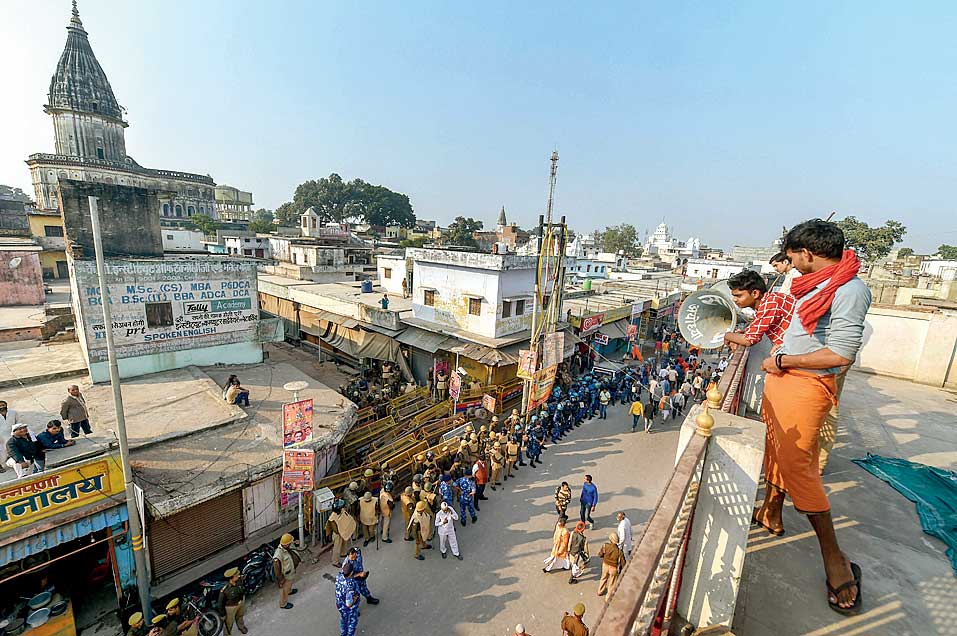The Muslim parties in the Ayodhya land dispute case don't want to talk about what could happen after the Supreme Court judgment that is expected tomorrow. They want peace, they will accept the judgment, and they want to be done with the case, some of them say.
They are worried about Sunni Central Waqf Board chairman Zufar Ahmad Farooqui's attempt at a settlement with the Hindu side through mediation. After the 39-day hearing in the Supreme Court, there were reports that Farooqui had sent a proposal to a court-appointed mediation panel allegedly suggesting withdrawal of the suit. Farooqui later confirmed that he had handed an out-of-court settlement proposal to the mediation panel on the Ayodhya land dispute, but insisted that he never submitted any letter to withdraw the case.
The five-judge bench, headed by Chief Justice Ranjan Gogoi, reserved its judgment after the hearing ended on October 16.
The original five Muslim petitioners have been fighting the case since the 1950s, as have been several Hindu parties.
One of the litigants said he hoped the judgment will be based on facts, and not 'aastha (belief)'.
A common worry for many of them was the rabble-rousing on some TV channels.
Iqbal Ansari, the son of Hashim Ansari who now represents his father in court, said: “We have repeatedly said that whatever the court decides, we will accept it.” He did not feel the waqf board chairman’s proposal could influence the case now that “the file has been closed”.
He also blamed news channels for escalating the matter in a way that could disturb peace. “Television toh jo hai. Woh paani barsegi toh bhi dikhayeinge, aur nahin baresega toh bhi. Nahin barsa toh barsaya jayega (television will show it if it rains and even if it doesn’t. If it doesn’t rain then the channels will make the rain happen),” Ansari said.
Haji Mehboob, a second-generation petitioner, too was annoyed with the media. He did not rule out that the wakf board chairman may have tried to influence the outcome in some way. “Sau taang mein ek taang nahin rahegi toh kya hoga (of the 100 legs, if one is removed, what can happen)?' he said. 'There are so many parties involved. The waqf alone is not the owner (of the land). There are board members in the waqf. If the board doesn’t agree what can one person do. Whatever he did, he did on his own wish,” Mehboob said.
Like Ansari, Mehboob refrained from talking about what may happen after the court’s decision. It would be good for all sides if peace is given a chance, he added.
If the Muslim side wins the case, “I told them (the other petitioners) that for the good of the country, for peace to prevail, the site should be covered up and the construction of a mosque be postponed. We all agree on this,” he said. “And whenever there is Allah’s order, it will be built.”
Mohammad Umar, another litigant, agreed with Mehboob, saying that only after there is peace, should Muslims think about building a mosque. He said that outsiders with political interests don’t want the matter to get resolved. ““We will accept the verdict. Kab tak ladte rahenge! Jab tak faisla nahin hoga tab tak koi shanti nahin hogi (how long can we fight! Until there is a decision there won’t be any peace).”
One of the local prominent faces of Ayodhya, Haji Misbahuddin, who is a third-generation litigant representing his grandfather Shahabuddin, was concerned about what his comments might lead to. “You all are watching it and understanding what’s happening, so I won’t like to comment or commit to anything,” he said. “Jis desh mein rehte hain wahan ke kanoon ko, wahan ke aqaid ko maanna hi hai na. Aur manenge, shuru se keh rahe hain (we should accept the law and belief system of the country where we live. And we do, we’ve been saying that from the start),” he said.
The Faizabad chapter’s president of Jamiat Ulema-e-Hind, Mufti Hasbullah alias Badshah Khan, repeated what Arshad Madani, the organisation’s president said on Wednesday. A mosque under the Sharia law will always remain a mosque, be it Babri or any other, he said. He also added that land given to the waqf will always remain waqf property whether people agree or not. “We’ll wait for the verdict. We just hope that the judgment is done on the basis of facts, and not mere aastha (belief),” Hasbullah said.











